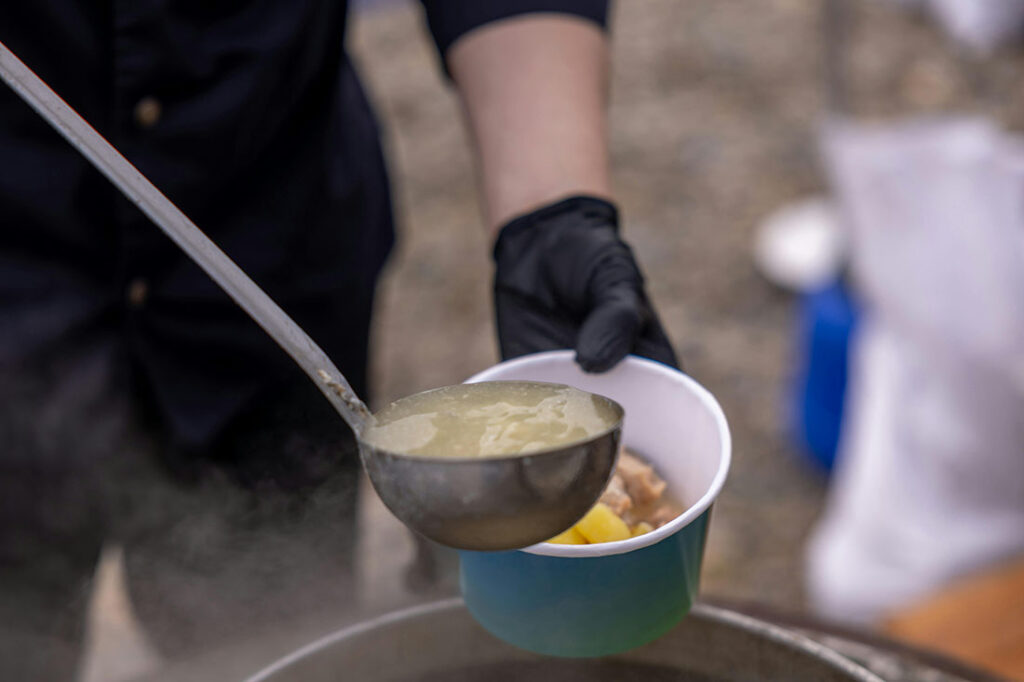Room at the Inn keeps busy — and needs additional volunteers
With Room at the Inn (RATI) now at a permanent location at 1509 Ashley Street, several changes have been made as the local shelter has now been operating year-round for just over a year.
With recent funding, a transition program began, along with a hired caseworker. Along with its successes, RATI’s year-round operations have come across new and different challenges, including a long waitlist — not just during the cold winter months.
“We didn’t expect to have so many people staying here during the summer,” said Jacqie Melloway, operations manager. “This was the first time we’ve been open during the summer” in addition to wintertime hours. She said the shelter’s motto is, “If everyone is alive and everyone has their fingers and toes, we did our job.”
Melloway runs the shelter daily, arriving at around 5 p.m. Loaves and Fishes, the soup kitchen, is there from 4:30 to 6 p.m.; the folks coming for the evening meal must be finished by 6 p.m. to give Melloway and her crew time to prepare the building for overnight guests.
Not everyone who comes to the soup kitchen is homeless or needs overnight shelter, so volunteers have to check in those who are spending the night. Each guest who was there the night before must check in between 6:30-7:30 p.m., or their cot is cleaned and given to someone on the waitlist.
Guests who want other services, such as transitioning from homelessness to sheltered living, may meet with a caseworker who conducts an assessment and comes up with a specific treatment plan for that person. When their milestones are reached, they trade their cot in for a twin-sized bed and a locker, giving them a place to store their belongings. Otherwise, those guests have to take all of their belongings with them because RATI has limited storage space. Each guest will have a chore to do every night.
RATI is joining with Turning Point, Loaves and Fishes, and Voluntary Action Center to create the Opportunity Campus, which recently broke ground for construction.
Before that facility is ready, perhaps by the end of 2025, individuals who have lost their identification or social security cards can get help from RATI to get new cards. And recently, more guests have found permanent housing through the transition program. Even more, females are having success with the program.
“One of them used to be a nurse,” Melloway said. “She has a house, but is behind on her mortgage, so it has no electricity or water. We helped her get her nursing license renewed, so she is currently looking for a job. She is staying at the shelter until she can go back home.”
RATI helped the woman get a bicycle for transportation so that she can look for work and save money to get back into her house.
RATI’s capacity is eighty-two cots, twenty-two of which are for women. Melloway said the shelter typically sees fewer females than males, though individuals of both genders have been consistent guests. Some stay for a few days and leave, freeing up space for the others who will stay for a few days and then leave. Many others are staying every night.
When RATI was only open for the winter, it had more cots, therefore more availability. Melloway keeps track of the number of guests that are turned away each night. All the guests who stay every night are also tracked. At the end of September, Melloway had to turn away nine males two nights in a row. One night in January 2024 she turned away seven males.
“I’ve definitely seen an increase in homeless people in Columbia. A lot of towns outside of Columbia, and even states outside of Missouri, will send people here because we have a lot of resources,” she said. “We have a lot of resources, but not a lot of housing for them.”
Many of RATI’s guests have housing vouchers, or they’ve had them but they couldn’t find a place, so the vouchers expired. It can be difficult to attain a new voucher because Columbia Housing Authority sometimes doesn’t have funding to give out more vouchers. Other guests have homes but are in Columbia because they are having a difficult time getting back to their homes.
If they’re willing to look outside of Columbia for housing, like Jefferson City or Fulton, they would be more likely to find something, Melloway explained.
RATI is struggling to find volunteers most days. When the shelter rotated among Columbia’s churches, there were a lot more volunteers, she said. RATI board members and nursing students will come in to help, however, now that the shelter has a permanent location, there are often fewer than ten volunteers. The paid staff consists of two supervisors and part-time support specialists, totaling up to ten paid employees.
To become a volunteer, go to RATI’s website at https://roomattheinncomo.org/volunteer and sign up.










